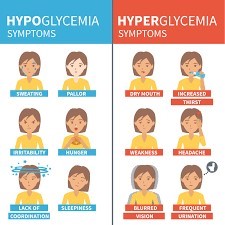A nurse is caring for a school-age child who is taking valproic acid. The nurse should expect the provider to order which of the following diagnostic tests?
Chest x-ray
Serum liver enzyme levels
ABGS
Urine culture and sensitivity
The Correct Answer is B
- A. Chest x-ray is not correct because it is not related to valproic acid therapy or its adverse effects.
- B. Serum liver enzyme levels is correct because valproic acid can cause hepatotoxicity and liver function tests should be monitored regularly.
- C. ABGS is not correct because it is not indicated for valproic acid therapy or its adverse effects.
- D. Urine culture and sensitivity is not correct because it is not related to valproic acid therapy or its adverse effects.
Nursing Test Bank
Naxlex Comprehensive Predictor Exams
Related Questions
Correct Answer is ["B","C","E","F"]
Explanation
- A. Bowel sounds are hypoactive in all four quadrants, which is expected after an appendectomy due to anesthesia and decreased peristalsis. This is not a finding that needs to be reported to the provider.
- B. Oxygen saturation is 93% on room air, which is below the normal range of 95% to 100%. This could indicate impaired gas exchange, respiratory depression, or infection. This is a finding that needs to be reported to the provider.
- C. Nausea is a common feature of appendicitis and should go away with appendectomy. This finding should, therefore, be reported to the healthcare provider.
- D. Vomiting is also a common side effect of morphine and anesthesia, and can be managed with antiemetics and fluids. This is not a finding that needs to be reported to the provider unless it persists or interferes with oral intake.
- E. Pain level is 6 on a scale of 0 to 10.The client received morphine as prescribed at 1815, and the pain level is still significant. This isa finding that needs to be reported to the provider
- F. Heart rate is 110/min, which is above the normal range of 60 to 100/min. This could indicate pain, anxiety, dehydration, infection, or bleeding. This is a finding that needs to be reported to the provider.
- G. Incision characteristics are clean and dry, which is expected after an appendectomy. However, the nurse should monitor for signs of infection such as redness, swelling, warmth, drainage, or odor. This is a finding that needs to be reported to the provider if any signs of infection are present.
- H. Lungs sounds are clear on auscultation, which is expected after an appendectomy. However, the nurse should encourage deep breathing and coughing exercises to prevent atelectasis and pneumonia. This is a finding that needs to be reported to the provider if any abnormal lung sounds are heard such as crackles, wheezes, or diminished breath sounds.
Correct Answer is A
Explanation
Irritability.

The rationale for each choice is as follows:
- A. Irritability: Correct. Irritability is one of the signs of hypoglycemia, which occurs when blood glucose levels fall below 70 mg/dL (3.9 mmol/L). Other signs include shakiness, sweating, hunger, headache, confusion, and blurred vision.
- B. Increased urination: Incorrect. Increased urination is one of the signs of hyperglycemia, which occurs when blood glucose levels rise above 180 mg/dL (10 mmol/L). Other signs include thirst, dry mouth, fatigue, nausea, and fruity breath odor.
- C. Vomiting: Incorrect. Vomiting is not a specific sign of hypoglycemia or hyperglycemia, but it can occur as a complication of either condition if left untreated or poorly managed.
- D.Facial flushing: Incorrect. Facial flushing is not a sign of hypoglycemia or hyperglycemia, but it can occur as a side effect of some medications used to treat diabetes, such as niacin or rosiglitazone.
Whether you are a student looking to ace your exams or a practicing nurse seeking to enhance your expertise , our nursing education contents will empower you with the confidence and competence to make a difference in the lives of patients and become a respected leader in the healthcare field.
Visit Naxlex, invest in your future and unlock endless possibilities with our unparalleled nursing education contents today
Report Wrong Answer on the Current Question
Do you disagree with the answer? If yes, what is your expected answer? Explain.
Kindly be descriptive with the issue you are facing.
